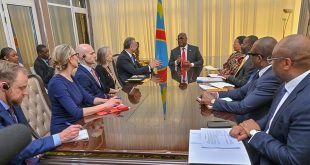
By Eriasa Mukiibi Sserunjogi
Activists for Change (A4C) National Coordinator Mathias Mpuuga, organisers of the Walk-to-Work campaigns that paralysed Kampala and neighbouring towns in April and early May spoke to The Independent’s Eriasa Mukiibi Sserunjogi about a new round of protests.
Why are the new protests necessary?
I wouldn’t call them protests but awakening campaigns to the fact that what we thought was bad has actually worsened. We thought at the beginning of our campaign in April that things will be bettered by the actions of the state and the natural factors like rain but it has not had the effects we expected. We expected the government to exhibit sensitivity by way of reducing government expenditure, curbing extravagance. This must stop. We must pay more attention to priorities like healthcare and education.
If the issues that led to the Walk to Work protests were not addressed, why bother with another round that will not deliver results?
Were the objectives of Walk to Work fulfilled? Yes and no. In the beginning the state was dismissive but they later admitted there was a problem, although they still said they wouldn’t do anything about it. The President and the government advised us to wait because the State of the Nation address and the national budget would address some of the matters. That is when we announced a moratorium. The budget scrapped duty on kerosene to reduce pressure from the rural folk on what they were spending on kerosene as a major source of energy to the rural people. The government removed 50% duty on sugar. But the price has more than doubled.
Why do you think this time round you will create a difference?

It is the timing. This new campaign will help us realign members of parliament to the suffering of the masses. We want the common man to speak again; the way they spoke during the Walk to Work campaign. I think the example of teachers is reason enough for us to do something. The government was originally dismissive but it later admitted that there should be realignment of votes to cater for teachers’ demands. There is a lot of money that is being abused and wasted; this is the money we want to redirect to the service of the people.
But some people have criticised protests for causing suffering and death. How are you ensuring that this time the ordinary people don’t suffer?
I think you are raising a good question to the wrong person. We have repeatedly said that our campaigns are peaceful and we have always cautioned our activists to remain peaceful and act within the confines of the law. It is our duty to remind the police and government if they have forgotten that they have no legal backing whatsoever to maim, disperse and kill people who are protesting. It is a right for people to protest against what they think is not right.
The police usually say they need you to liaise with them when you organise protests. Are you doing that this time?
It is the same tired argument of the police. Even if we have not informed them, they have no right to kill.
But the police say you, the organisers of protests, don’t have control over the protesters.
Are they indicting themselves that they have no capacity to deal with masses? If they can’t handle masses, let them resign.
What have you done about the victims of the Walk to Work protests who were killed, maimed or arrested during the Walk to Work protests?
We, individually and as an organisation, helped some that we could identify. As part of our campaign that we have named Light a Candle, shall host vigils in memory of the victims. At least we know ten and we have named them. We are going to be visiting the victims’ families and graveyards as a way of showing Ugandans that nobody has a right to kill and get away with it. We have began a process of litigation against the government and individuals we know who participated in these gruesome murders. We are demanding that the government produces those people who are being held incommunicado on account of being accused of participating in our awakening campaigns.
To put it in perspective, how many victims have you helped?
We have got over 400 Ugandans out of jail around the country. I am not saying this is something we are proud of, but it goes to show you the extent to which the state is determined to frustrate people’s demands.
As you relaunch the protests, what do you say to the accusation that you are actually sabotaging an already ailing economy?
I don’t know a worse economic saboteur than a thief. Let the President arraign his ministers who are suspected of having stolen public funds instead of pointing fingers at activists.
Apart from redirecting resource allocation, what other measures could the government have taken to address the situation?
We demanded that the government reinstates national food silos and fuel reserves. You saw that in the budget the government is now saying they are going to do it.
If the government is showing signs of addressing your demands, why resume protests then?
They are addressing some of them but we are saying they are not doing enough. For the President to react to the teachers’ demands and say resources should be reallocated, it shows he is aware of the profligacy in his government. The only way we can get the resources to serve Ugandans better is by exerting more pressure on the government.
Is the coming round of protests also to take the form of Walk to Work?
We shall start with the Light a Candle campaign, prayers and rallies. Many other activities will take place as we will announce from time to time.
What is your ultimate goal as you talk of resuming protests?
At the end of the day, we want to change the character of the Ugandan state. The state holds the people in contempt and takes them as its servants. As long as this continues, nothing will ever change in this country. We want to demystify the gun and make those carrying it to realise that they are there to serve Ugandans.
 The Independent Uganda: You get the Truth we Pay the Price
The Independent Uganda: You get the Truth we Pay the Price



